- Home
- Annie Proulx
Close Range Page 13
Close Range Read online
Page 13
“Well,” she said. “Here we go.”
“That wheat needs cuttin,” he said.
She drove and he stared at the far horizon visible beneath the bellies of cows. They bounced over pasture, the dust in the truck cab shaken loose and suspended in a fine sparkling haze as though an emanation from their private thoughts that might coalesce into audible statement. He opened the gates. Ottaline thanked him, pointed out the good qualities of the cattle, the trim, heavily muscled bodies on straight legs, the rib-eye bulge on each side of the backbone, their large size. He murmured at a coarse-fronted cow with a steery look to her, pointed out some small and sickle-hocked steers with flat loins. He counted, made notes and added figures, offered a fair price.
“You are a knowledgeable girl,” he said, “and a damn good-lookin one, though upholstered. Care for a beer?”
Ottaline spent the morning tipping back beer bottles with Flyby, who described the lonely life of a cattle dealer’s son, illustrating his sad sentences with long, flat gestures of his hand. It was noon when he left.
She gave the figures to Aladdin from the bedroom doorway, hanging back. Dazed and fiery bursting with tea, he nodded, said all right. It was all right. He did not need a computer to know the margin to a penny. It was all right, and wasn’t that a sad relief. He couldn’t say as much for himself.
That night old Red woke from his shallow sleep to a stiff, whistling risp he dreaded to hear. His heart beat, he rose and felt his way to the pantry window. The dirty moonlight fizzed through shredded clouds, glanced off a swinging scythe blade, though it was not Death come for him this time but a man in a dark hat cutting the wedding wheat in hissing swathes, stopping at the end of every row to swig from a bottle. He saw his grand-daughter Ottaline, mouth cracked wide, her hundred teeth glinting like a mica bed, leaning against the doorframe of the blue-door shed. She hurled a piece of oily metal into the sky, where it twisted and fell, stooped for another, sent it flying.
Old Red watched, summed it up. “I drove teams. I cowboyed. Worked since I was a kid. Run sheep and run cows. Still present, fork end down, ready as a dog with two dicks. I ain’t finished my circle yet.”
Tyler and Shan were far away hoping for good luck, but here was Ottaline and her hay maker. He wouldn’t waste his dear breath laughing.
There was a wedding in September and a tremendous picnic under the Amendinger cattle-sale canopy, red and white stripes that cast a rose flush, trestle tables in the side yard, pork barbecue, a baron of beef pit-roasted, spitted lamb, prairie oysters, sweet corn, giant shrimp in Tyler’s ketchup sauce, oven rolls, a keg of sour pickles, melons, ripe Oregon peaches made into deep-dish pies, and a three-tier wedding cake with pale-blue frosting topped by a tiny plastic bull and cow. The day was hot and clear and the Red Wall trembled on the horizon. Out beyond the fence the stripped frame of the 4030 lay where Aladdin had dragged it, on its side in the sagebrush. Wauneta wept, not for her daughter but for the cut wheat. Tyler inspected the ranch, looking it over with a displeased eye. Everything was smaller and shabbier. Why had he wanted this? He had a cell phone and sat on his horse talking to someone far away. Wauneta told Shan she intended to come out to Las Vegas and visit one of these days.
“Not if I got somethin to say about it,” said Aladdin.
The guests dragged the folding chairs back and forth, and when Ottaline smoothed the rayon satin of her dress over her knees she felt the grit, saw the glinting dust caught in the weft. A spot of barbecue sauce marked the bosom. At last she changed into the new aquamarine pants suit and drove away with Flyby Amendinger for a four-day honeymoon among the motels of Nebraska.
Where wheat once grew a row of doghouses stood. There were two trucks in the driveway. Old Red in his pantry wished for deafness when the bedsprings sang above. Otherwise all was the same.
Aladdin applied for a bank loan for another plane. “I said if the Lord spared me I’d get it.” He was dreaming of a 1948 Aeronca Sedan, a loose, big-cabined thing with feminine curves and a split crankcase to be replaced with an undamaged one from Donald’s Cowboy Junkyard.
“She’s so roomy, if I had to I could put a couple calves in her, bales a hay, cake, just about anything, even Ottaline, ha-ha.”
The bank approved the loan and on a quiet and grey morning, the wind lying low, Aladdin started his truck, got halfway down the drive, backed up, parked and came into the kitchen. Old Red dunked his toast in black coffee.
“I am goin a fly that plane home,” he said. “I will land in the Triangle pasture. Preciate it you was all out there watchin. You, too, bubba,” he said to his son-in-law.
“I got a go look at Trev’s cows this mornin.” Flyby Amendinger did not like living under the thumb of Aladdin Touhey. In the night he complained to Ottaline that Aladdin was worse than his mustachioed father.
“My block don’t fit his tackle,” he whispered.
“It sure fits mine,” she whispered back.
“Call Trev up. Say you’ll come a little later. He won’t give a shit. I want a see everbody out wavin. Cause for celebration get a plane on this damn place again. Goin a teach Ottaline how to fly it.”
It was mid-morning when they heard the drone of the engine.
“Ma!” shouted Ottaline into the house. “He’s comin.”
Wauneta came outside and stood with Ottaline and Flyby staring at the horizon. Old Red hobbled onto the porch. The wind had come up and was gusty and chill, the distant line of cliff marking a dull red break in the sere plain. Wauneta ran back into the house for her jacket.
The plane flew over and headed toward the Red Wall, turned and came again in their direction, very much lower. It passed over them twenty feet off the ground. Aladdin’s head was barely visible in the smoke from home-grown that clouded the cabin. The plane soared up, shaking in the wind. It rose in a steep climb, leveled out and sailed away. When it was only a distant speck it turned and came toward the ranch again, curving and sliding, coming low. At a certain angle it resembled a billboard in the sky.
“He is actin up,” said Wauneta. She watched the plane roar in low like a crop duster.
“I think he is goin a land,” said Flyby, “or take a soil sample. Or stake out a homestead.”
“He is actin up. I know him.YOU GET DOWN HERE !” Wauneta shouted at the plane.
As though obeying her, it touched the ground, sending up a puff of dust, bounced back into the air, and made two more prodigious hops before the left wheel caught the iron frame of the abandoned tractor and the plane fell on its face, crumpled into a mash of cloth, metal and rancher. There was an explosion like a mighty backfire, but no flame. A ball of dust rose.
Flyby dragged Aladdin to safe ground. His father-in-law’s head lolled at an unusual angle.
“He is dead, I think. I think he is dead. Yes, he is dead. His neck is broke.”
Wauneta shrieked.
“Look what you done,” said Ottaline to her. ‘You killed him.”
“Me! That’s what cuttin the wheat’s done.”
“He done it hisself,” called old Red from the porch. It was clear to him the way things had to go. They’d plant Aladdin. Ottaline and her scytheman would run the ranch. Wauneta would pack her suitcase and steer for the slot machines. The minute she was out of sight he intended to move out of the pantry and back upstairs. The main thing in life was staying power. That was it: stand around long enough you’d get to sit down.
Pair a Spurs
THECOFFEEPOT
THECOFFEEPOT SOUTHEAST OFSIGNAL HAD BEEN ANo.k. little ranch but it passed down to Car Scrope in bad times—the present time and its near past. The beef-buying states, crying brucellosis which they fancied cattle contracted from Yellowstone bison and elk on the roam, had worked up a fear of Wyoming animals that punched the bottom out of the market. It showed a difference of philosophies, the outsiders ignorant that the state’s unwritten motto,take care a your own damn self, extended to fauna and livestock and to them. There was a deeper malaise: all ove
r the country men who once ate blood-rare prime, women who once cooked pot roast for Sunday dinner turned to soy curd and greens, warding off hardened arteries,E. coli -tainted hamburger, the cold shakes of undulant fever. They shied from overseas reports of “mad cow” disease. And who would display evidence of gross carnivorous appetite in times of heightened vegetarian sensibility? To counteract the anti-meat forces Scrope contributed ten dollars toward the erection of a roadside sign that commanded passersby toEAT BEEF and, at the bottom, bore the names of the seventeen ranchers who paid for the admonition.
It was a bitter winter and a late spring; he was feeding into May waiting for green grass. Every ranch was out of hay and the nearest source was a long day’s journey to eastern Nebraska where the overall boys squeezed them hard. Ten days before June a blizzard caromed over the plains, drifting house-high on lee slopes, dragging a train of arctic air that froze the wet snow, encased new calves in icy shells. For a week the cold held under glassy sky, snow-scald burning the cows’ udders; it broke in minutes under a chinook’s hot breath. Meltwater streamed over the frozen ground. The bodies of dead stock emerged from fading drifts, now you don’t, now you see em, a painful counting game for ranchers flying over in single-engines. Scrope’s yard flooded, a mile of highway disappeared under a foot of water while they held his mail at the post office, but before it ebbed another storm staggered in from the west and shucked out six inches of pea hail, a roaring burst that metamorphosed into a downpour, switched back to hail and finally made a foot of coarse-grained snow. Two days later the first tornado of the season unscrewed a few grain elevators from the ground.
“I never seen so goddamn much weather packed into two weeks,” said Scrope to his neighbor, Sutton Muddyman, the two mud-speckled pickups abreast on the chewed-up road, tailpipes rattling. The dogs in the truck beds ran back and forth in parallel tracks and grinned at each other.
“Spanked us around pretty good,” said Muddyman. “What worries me is the snowpack. There’s still the bulk a the snowpack up in the mountains and when she starts to melt we’ll see some real water. ThatEAT BEEF sign puttin you in the money yet?”
“The only people see it is the ones live on Pick It Up. All two a them. I suppose we should a put it on a blacktop highway where there’s some traffic.” He scratched the rashy hollow of his throat. Blond stubble glinted on his cheeks. “Hell,” he said, “it’s all hard times in this business. You was smart to get out.”
“Car,” said Muddyman, “don’t think for one minute that I got it easy. I get the rough end a the pineapple ever day. I guess I better get goin. Inez’s ice cream’s meltin out a the bag.”
“Take it on home, Sutton,” said Scrope stepping gingerly on the gas prong, the pedal gone for months, while Muddyman eased south in his gravelly ruts.
Scrope, forty years old, had lived on the Coffeepot all his life and suffered homesickness when he went to the feed store in Signal. He’d acquired a morbid passion for the ranch as a child when he believed he could hear its grass mocking him. This ability had come the year Train, his older brother, died in some terrible and private way in the bathroom where their mother found him, an event he had never understood and still did not. In that time he couldn’t grasp what was going on or might happen next, for his parents said nothing to him, but stayed close to each other whispering and weeping. He would hear them in the kitchen, their low voices trickling on and on like two water seeps, but when he stepped in, boots squeaking, they fell silent. Train’s name could not be mentioned, that much he knew. Later they lied to him about such inconsequentialities as the names of weeds, the freshness of the butter on the saucer, how much school a ranch boy needed—not much, his father said, then complained years later that Car had not become a banker or insurance man. After his father’s funeral he asked his mother straight-out, “What was all that stuff you and Da used to talk about? Was it about Train? What happened to him, anyway?” but she looked away from him and through the window, her gaze traveling out to the red hoodoos and the crumpled sky beyond and she said nothing at all.
The grass, on the other hand, never shut up, making a kind of hissing snicker like sawed-off John Wrench in high school days in the last row of the movies when he asked a girl to have some of his popcorn, his penis thrust through the bottom of the box up into the greasy kernels. Scrope’s ex-wife Jeri had had some of that popcorn.Best one lost, worst one stays, hissed the grass.
The Coffeepot was small but well-balanced, eight sections of mixed range, some irrigated hay ground (not enough), grazing rights to BLM land. Bad Girl Creek watered the ranch, in low ground twisted into a slough improved by beaver to three small ponds. A dusty driveway, intersected by a line of power poles slung with a single wire, wandered in from the main road, numerous side-branches cutting toward the far parts of the ranch. Eighty yards west of the ranch house Mrs. Freeze’s house trailer rested on cinder blocks in the shade of a cottonwood. An arrangement of corrals and fences led to a mild slope and at the height of the rise Scrope had put up a calving barn.
Scrope’s old man had built the log ranch house after World War Two, and the son had changed nothing, not the faulty plumbing with its mineral-clogged pipes, nor the rusty porch swing that had stained Jeri’s flowery skirts. The entryway was as much dog kennel, opened into the kitchen. A photograph of the ranch taken in 1911 hung above the table, gaunt Scrope ancestors grinning in front of their dugout, the shadow of the photographer touching their feet. It had been there so long Scrope couldn’t see it, yet was aware of it in the same way he was aware of oxygen and daylight—he’d notice if it was gone.
The southeast corner of the ranch was high bony ground populated by a pair of bobcats, a few rattlesnakes; the distinctive features were a big wash and red crumbling hoodoos that sprouted fossils after heavy rain. Once a desperate runaway from the juvenile detention home hid out beneath an overhang for a week. In the rags-and-blood sunset Car had caught him sneaking burned carrots and beef tallow out of the dog’s dish, invited him in, learned his name was Benny Horn, slid him a plate of beans, candy bar for dessert, pointed out a tick on his neck and talked him into giving himself up, promised a below-minimum-wage, part-time, seasonal job when he got out.
“I knew your daddy,” he said, remembering a shiftless loud-mouth. When the kid left so did a stack of change on the windowsill and two mismatched socks from the back of a chair.
For twenty years the Coffeepot’s foreman had been a woman, Mrs. Freeze, a crusty old whipcord who looked like a man, dressed like a man, talked like a man and swore like a man, but carried a bosom shelf, an irritation to her as it got in the way of her roping. The old man had hired her a few months before he crossed the divide and at first local talk was that he’d lost his mind.
The terrain of Scrope himself consisted of a big, close-cropped head, platinum-blond mustache, a ruined back from a pneumatic drill ride on the back of a sunfishing, fence-cornering, tatter-eared pinto that John Wrench, two decades earlier, had correctly bet he couldn’t stay on, feet wrecked from a lifetime in tight cowboy boots, and simian arms whose wrists no shirt cuffs would ever kiss. His features, a chiseled small mouth, water-colored eyes, had a pinched look, but the muscled shoulders and deep chest advertised a masculine strength that had, over the years, attracted not a few women. His marriage, brief and childless, fell apart in half an hour. Then he looked at the moon through a bottle every night, watched pornographic videos, ate, in addition to large quantities of beef and pork, junk food from plastic sacks which set off itchy rashes and produced bowel movements containing long orange strands as though he had swallowed and digested a fox.
THEBOXHAMMERHANDLE
Directly south of the Coffeepot lay the Box Hammerhandle—Sutton and Inez Muddyman’s place. Sutton Muddyman, of bunchy muscle and oily black curl, claimed dude ranching was hard work made harder by the need for intense and unremitting cheeriness, and although he and Inez weren’t suited to the constant company of urban strangers it paid the bills and brought th
em more Christmas cards than they could open. Their daughter Kerri was a pastry chef in Oregon and living with a reformed gambler of whom they wanted no news. They kept thirty or so horses on the ranch, a small band of sheep, pack llamas and a pirate’s crew of dogs constantly in trouble with skunks and porcupines, once with the bobcats who gave them lasting memories of a trespass in the hoodoos.

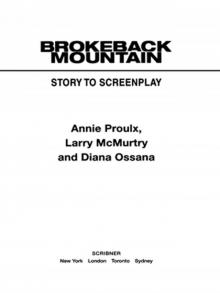 Brokeback Mountain
Brokeback Mountain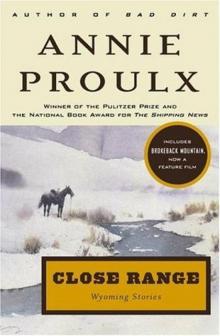 Close Range
Close Range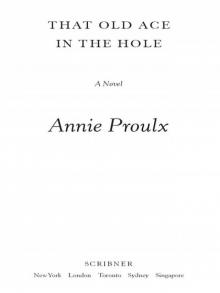 That Old Ace in the Hole
That Old Ace in the Hole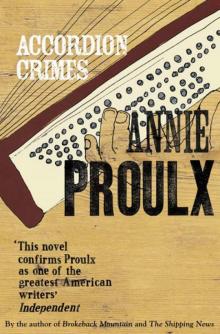 Accordion Crimes
Accordion Crimes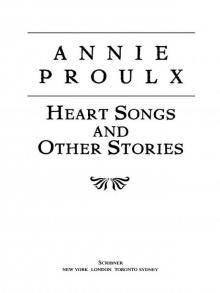 Heart Songs and Other Stories
Heart Songs and Other Stories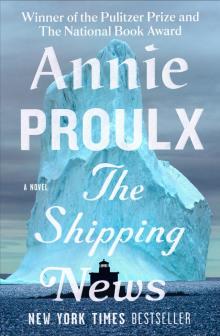 The Shipping News
The Shipping News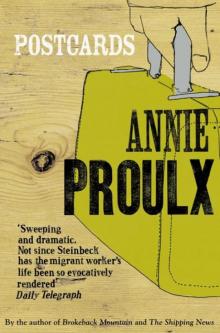 Postcards
Postcards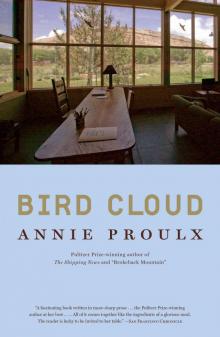 Bird Cloud
Bird Cloud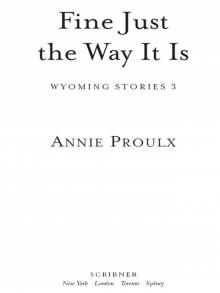 Fine Just the Way It Is
Fine Just the Way It Is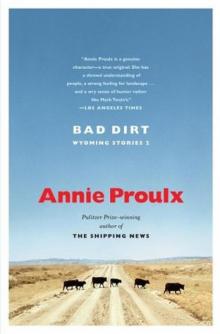 Bad Dirt
Bad Dirt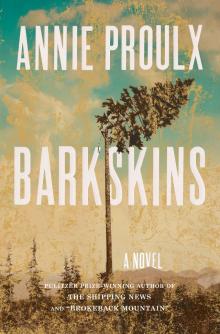 Barkskins
Barkskins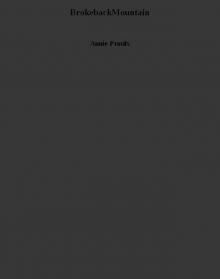 BrokebackMountain
BrokebackMountain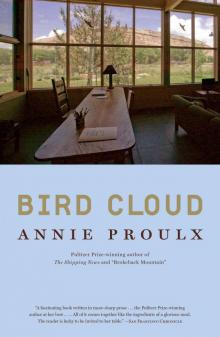 Bird Cloud: A Memoir of Place
Bird Cloud: A Memoir of Place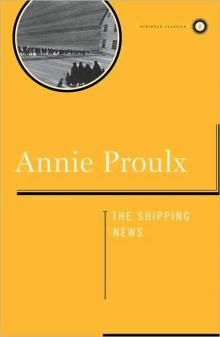 Shipping News_A Novel
Shipping News_A Novel